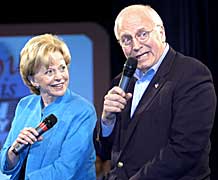
Lynne Cheney's anecdote about the red dress that her grandma from Cabool had made for her to wear on her first date with Dick was one she had told before to a Missouri crowd, but it was not less homey in the re-telling. With daughter Elizabeth (Liz) Cheney-Perry who introduced them, the Vice-president and Mrs. Cheney were given a warm Midwestern reception by a select group of about 500 Republicans who assembled for a "town hall" meeting at the John Q. Hammons Trade Center in Joplin yesterday.
"Saddam is in jail exactly where he belongs," was the comment from the vice-president that brought one of several rounds of applause by an audience that without a doubt favored the Bush Administration's tough stance on terrorism. They also applauded him when he said that the United States would make sure that no one was going to sell anything to anybody, referring to the credit the Administration is taking for curtailing Libyan dictator Moammar Qhadafi's aspirations on having weapons of mass destruction after "seeing what we did to Iraq."
In case anyone forgot with whom the United States was dealing, Vice-president Cheney described the enemy as being "different," embracing a "radical extremist ideology," and "prepared to use weapons of mass destruction if they can get their hands on it."
"It doesn't take lots of them," he said, as he referred to the "beautiful September morn" when "it took 19."
Cheney told the audience that they should be "assured that the government in place would be able to move in and take over more responsibilities." In taking military action, he said that when considering a threat to the safety of the nation that with the perspective that we have, the Bush/Cheney Administration would not wait for the next attack.
He was careful later on in discussing the role of the Patriot Act in fighting terrorism saying that we should apply the same rules against terrorists as we would to drug traffickers. He said we need to find the resources necessary without changing our fundamental way of life. There would be "a line you don't want to cross over," he said, that would allow "the terrorists to win without firing a shot."
In speaking of the role that the United Nations played regarding Iraq, he said that we "refused to be blocked" and that we would continue "not to seek a permission slip from anybody."
"George Bush believes that with every fiber of his being," he added. "The President has to make the tough calls for the benefit of everyone. Don't turn [the job] over to someone who doesn't have deeply held convictions about right and wrong."
These remarks led to a condemnation of the policies of Democratic opponents John Kerry and John Edwards and the argument that they voted against the appropriations bill that would have given American troops resources they needed in combat. "We need somebody to support the troops 100%," Cheney said.
In the spirit of a town hall meeting, microphones were handed to several people in the audience with questions. In supporting the argument that no child should be forced to stay in a failing school, Lynne was given the opportunity to answer the first question regarding why so many people were against the voucher program. While she thought that there was a concern over fundamental changes in the educational system, she said that choice "doesn't threaten public schools but provides a reason to improve them."
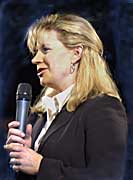
Although Liz Cheney-Perry is a graduate of the University of Chicago Law School and has held several key government posts, she threw the spotlight on her parents. A recent "mom" (Philip Richard Perry was born July 2, 2004), she recounted Cheney family life growing up in Wyoming and then moving on to Washington, D.C. The Cheney's have two daughters; younger sister Mary, who has represented the gay activist community, takes a less visual role in campaigning.
Mrs. Cheney also answered a question regarding the role government should play in religion and the moral/ethical responsibilities with regard to business. Seemingly side-stepping the second half of the question, she said that although there should be a separation between church and state, that it "doesn't mean driving them out of the public square." She said that students should be taught a "history of religion" so that they "understood the role that Providence played" in the beginning of our country.
On the subject of moral values, her husband called attention to the President's policy on stem cell research and called it one that the President "grappled with." Mention of the ban on partial birth abortions supported by the Administration brought a round of applause.
"Fellow Missourians are praying for you guys," was a comment made by a female independent trucker before she asked about the price of oil. Dick Cheney's response, in calling attention to the "51 different blends" required by local restrictions and the difficulty in getting permits for new refineries, seemed to suggest that the lowering of environmental restrictions might have something to do with alleviating the higher prices.
On the topic of reducing dependence on foreign oil, he called the issue a "source of frustration for us." "We are more efficient than 20 years ago," but he suggested that we badly need new resources and technologies to deal with the problem. He blamed Kerry and Edwards for not being on the Senate floor to provide the necessary votes to move on a conference report which addressed alternative fuel sources.
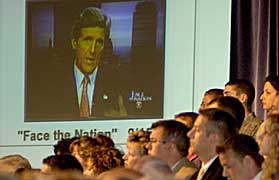
Before the Cheney's took center stage, Peter Kinder, the Republican hopeful in Missouri for lieutenant governor, warmed up the audience by introducing a 12-minute video that he labeled John Kerry's "flip-flop routine."
"You know there's abundant material there," Kinder said.
Kerry was shown speaking before quotes were flashed on the screen regarding his positions on war issues. At one point during a "Hardball" interview Kerry was heard saying, "yeah" to the question, "Are you one of the anti-war candidates?"
Ripples of laughter permeated the audience as Kerry's ambivalence was documented by the Bush/Cheney campaign organizers. Even Joe Lieberman's campaign rhetoric was used to denigrate Kerry's position on war.
An older gentleman's question in the audience gave Cheney the opportunity to discuss Kerry's senate record. Cheney's response painted Kerry as someone who slacked off from his role on an intelligence committee, someone who tried to introduce budget legislation in 1993 that even Ted Kennedy had to vote against, and someone who on 350 occasions voted for tax increases but was against supporting major weapons systems.
A question about how the "death tax" would impact their ownership of a farm held in the family since 1919, a local farmer was warned by Cheney that the Kerry/Edwards team might be opposed to making the phasing out of such a tax permanent. "The death tax is fundamentally unfair," he said.
The state of the economy, the concern of a younger member of the audience, gave the vice-president an opportunity to discuss President Bush's tax program that he said left "more money in the hands of people that earned it." He also said that the payroll numbers were skewed against those, like Lynne, who were self-employed.
When asked whether she still had the red dress by a young girl in the audience, Mrs. Cheney answered, "Oh no, sure wish I did!" That was the final question posed.
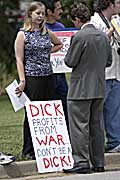
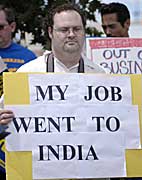
A group of protestors, including workers from the local Democratic headquarters and labor unions, lined up along the street in front of the John Q. Hammons Trade Center in Joplin to voice their disproval of the Bush/Cheney Administration. Pictured are signs representing the opinions prevalent. A secret service agent was heard commenting about the peaceful nature of the protest.






Comments